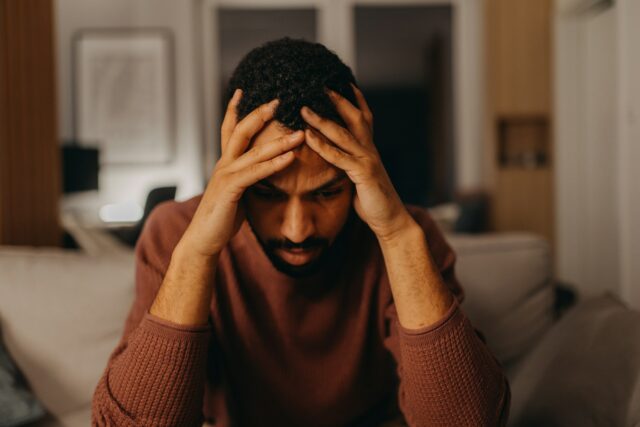Depression doesn’t always manifest as constant crying and an inability to get out of bed.

Many people who suffer from the condition are high-functioning and able to “mask” their feelings in order to live what appears to be a normal life, at least to everyone else. But even those who seem fine on the outside may be struggling on the inside. Here are some common signs that someone may be quietly dealing with depression, even if they don’t make it obvious.
1. They often say, “I’m fine” or “Don’t worry about me.”

People hiding their depression might brush off concerns with phrases that keep everyone at a distance. They use these responses to avoid deeper questions and keep the focus off themselves. It’s a way of saying “I can handle it” even if they’re feeling overwhelmed. Sometimes, it’s easier to say “I’m fine” than to explain what’s really going on.
2. They keep themselves unusually busy.

To avoid their feelings, some people dive into work, hobbies, or constant activity. Staying busy can be a way to keep their mind occupied and avoid confronting difficult emotions. It’s a coping mechanism that distracts them, but it doesn’t address the underlying issues. Busyness can sometimes mask deeper struggles.
3. They seem tired all the time.

Depression can be exhausting, and even if they’re masking it, that fatigue often shows. People hiding depression might often feel drained, regardless of how much sleep they get. This constant tiredness isn’t always from physical exhaustion – it’s the mental toll of putting on a brave face. Tiredness is often one of the first signs something is off.
4. They make self-deprecating jokes.

Humour is sometimes a way to downplay serious feelings, and people masking depression might make jokes at their own expense. It can be a way of hinting at how they feel without fully opening up. Self-deprecating jokes often have a grain of truth behind it. These jokes can sometimes be a way of reaching out without saying it directly.
5. They avoid deep or emotional conversations.

To keep people from getting too close, they might steer clear of conversations that could touch on personal struggles. Surface-level topics feel safer and help them keep their walls up. Avoiding emotional topics helps them keep their guard up. They may change the subject if things get too personal.
6. They may have trouble sleeping or sleep too much.

Sleep patterns can reveal a lot about someone’s mental health. People hiding depression might struggle with insomnia or, on the flip side, sleep more than usual to escape their feelings. Changes in sleep can be a common response to stress. When sleep shifts noticeably, it’s often a sign that something’s going on.
7. They’re extra sensitive to criticism.

Criticism can feel especially heavy when someone is already feeling low, even if they don’t show it. They might take comments more personally, even if they play it off as no big deal. Their self-esteem may be more fragile than it appears. Sensitivity to criticism is sometimes a sign of inner struggles.
8. They push people away while seeming friendly.

People hiding depression might seem friendly and open, but they often keep emotional distance from everyone around them. They may avoid close relationships to prevent anyone from seeing their struggles up close. It’s a way of keeping a barrier between them and other people. Masking can involve balancing openness with keeping people at arm’s length.
9. They have sudden changes in appetite.

Depression can impact appetite in various ways – some people lose their appetite, while others may turn to food for comfort. These changes aren’t always visible but can be a sign that something’s off. Shifts in appetite can reflect emotional distress. Food habits sometimes show what words don’t.
10. They seem overly focused on other people.

Some people distract themselves from their own pain by focusing on helping or supporting people. While this can be genuinely caring, it can also be a way to avoid their own feelings. Helping other people often keeps the spotlight off them. Sometimes, their kindness is a way to cover up their own struggles.
11. They might indulge in “retail therapy” or impulse buys.
 Source: Unsplash
Source: Unsplash Buying things can offer a temporary mood boost, so people masking depression might turn to shopping for a quick pick-me-up. This can be a way of distracting themselves from underlying issues. Retail therapy can fill a void, but only briefly. Spending impulsively can sometimes be a sign of coping.
12. They isolate themselves unexpectedly.

People masking depression may pull away from social events without explanation, preferring to be alone. Even if they usually seem social, sudden bouts of isolation can be a sign that they’re struggling. Isolation provides them a break from keeping up appearances. Time alone might feel like a safe retreat.
13. They focus heavily on their appearance.

Some people try to cover up inner struggles by putting extra effort into their appearance. This isn’t vanity – it’s a way to mask how they’re feeling on the inside. Presenting a polished exterior can help them feel more in control. It’s their way of showing strength even when they feel weak.
14. They have difficulty making decisions.

Depression can make even simple choices feel overwhelming, so people masking it might struggle with decision-making. Indecisiveness can be a subtle sign of mental strain. It’s not that they’re being difficult – they’re just feeling stuck. Decision-making often reflects their internal conflict.
15. They’re always the “strong one.”

People masking depression often feel the need to appear strong, reliable, and put-together for everyone around them. This can be a way to avoid showing any vulnerability. Being the “strong one” often means hiding their own struggles. They’re there for other people, even when they need help themselves.



